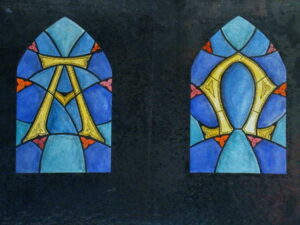 The seven churches discussed in this text were not symbolic representations; they were actual churches that existed in John’s era. In fact, one can embark on a tour of these church locations today. The distance between these congregations varied from approximately thirty to fifty miles (48 to 80 km), and a first-century messenger would likely distribute this book in the order mentioned here.
The seven churches discussed in this text were not symbolic representations; they were actual churches that existed in John’s era. In fact, one can embark on a tour of these church locations today. The distance between these congregations varied from approximately thirty to fifty miles (48 to 80 km), and a first-century messenger would likely distribute this book in the order mentioned here.
As mentioned earlier, the fact that seven churches are referenced in this passage should alert us to the possibility that there is something more to these messages. As we move into our exploration of Revelation chapters two and three, we’ll find that these churches also reflect various aspects of the historic Christian community and continue to do so today. Some of those characteristics are honorable and virtuous, while others are much less so.
The answer to that question becomes easier when we consider the function of a lampstand. The purpose of a lampstand is to provide light to others. This correlates with Jesus’ message to His followers in Matthew 5:14: “You are the light of the world…” With this in mind, we can say that these lampstands represent the assemblies of God’s people who serve as the light of the world. But even more significant is the fact that Jesus is in the midst of these lights, as we’ll see next.
Image Credit: Jonadab Public domain, via Wikimedia Commons


 In the original language of this passage, Alpha and Omega function much like the letters A and Z, for they each represent the first and last letters of their respective alphabets. Thus, we can understand this reference to mean that Jesus is the first, the last, and the “A to Z” of everything. Therefore, our text from Revelation 1:8 establishes Jesus as the beginning and the end of all things.
In the original language of this passage, Alpha and Omega function much like the letters A and Z, for they each represent the first and last letters of their respective alphabets. Thus, we can understand this reference to mean that Jesus is the first, the last, and the “A to Z” of everything. Therefore, our text from Revelation 1:8 establishes Jesus as the beginning and the end of all things.
 One notable aspect of Revelation 1:4 involves the repetition of the number seven. This holds considerable significance, for the number seven recurs fifty-four times within the twenty-two chapters of Revelation.
One notable aspect of Revelation 1:4 involves the repetition of the number seven. This holds considerable significance, for the number seven recurs fifty-four times within the twenty-two chapters of Revelation.
 The Biblical book of Revelation was authored by a man named John, a person who identifies himself by name three times within this book (
The Biblical book of Revelation was authored by a man named John, a person who identifies himself by name three times within this book ( We should also note the descriptive phrase that closes this verse: “the error of the wicked.” This serves to remind us that heretical teachers are not mistaken, confused, or misguided. Instead, this passage describes such individuals as wicked…
We should also note the descriptive phrase that closes this verse: “the error of the wicked.” This serves to remind us that heretical teachers are not mistaken, confused, or misguided. Instead, this passage describes such individuals as wicked… The New Testament letter of 1 John highlights the need to evaluate the spiritual ideas and beliefs we encounter when it tells us, “Dear friends, do not believe every spirit, but test the spirits to see whether they are from God, because many false prophets have gone out into the world” (1 John 4:1 NIV). That portion of Scripture reminds us that many spiritual teachings, experiences, or supposed displays of supernatural power may not come from God.
The New Testament letter of 1 John highlights the need to evaluate the spiritual ideas and beliefs we encounter when it tells us, “Dear friends, do not believe every spirit, but test the spirits to see whether they are from God, because many false prophets have gone out into the world” (1 John 4:1 NIV). That portion of Scripture reminds us that many spiritual teachings, experiences, or supposed displays of supernatural power may not come from God.